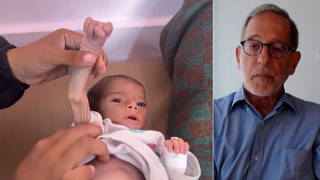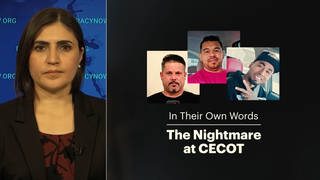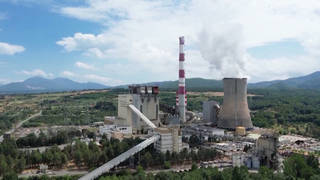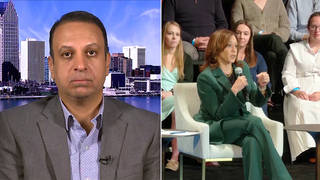
Guests
- Marc MorialPresident of the National Urban League. He was also Mayor of New Orleans from 1994 to 2002.
- Tracie Washingtonattorney focusing on civil rights law, education and labor/employment law. She is currently representing a number of evacuees in New Orleans who are staying in hotels and are facing eviction.
Over the years, the Arabic satellite television network Al Jazeera has come under intense criticism from governments around the Arab and Western world. Some leaders in the Gulf have objected to Al Jazeera’s presentation of views critical of governments in the region, and members of the Bush administration have claimed that the network is biased against the U.S and its policies. We talk with author Hugh Miles about the origins of the network. [includes rush transcript]
We are broadcasting from Doha, Qatar, where we are attending the second Al Jazeera Forum–a three-day gathering of journalists, scholars and media makers from the Middle East and around the world. It is being held to discuss new political, legal and technological challenges facing news organizations, and to debate the responsibility of the media in an increasingly fractured world.
The forum was organized by Al Jazeera–the Arabic satellite television network headquartered in Doha. Al Jazeera first began broadcasting in 1996 and has grown to be the fifth most powerful brand in the world, according to Brandchannel.com.
Over the years, the network has come under intense criticism from governments around the Arab and Western world, and from across the political spectrum. Some leaders in the Gulf have objected to Al Jazeera’s presentation of views critical of governments in the region. And members of the Bush administration have claimed that the network is biased against the U.S and its policies. In fact, in August of last year, the U.S.-backed Iraqi government banned the network from reporting in Iraq.
Al Jazeera has also been the victim of U.S military attacks. The U.S. bombed Al Jazeera’s bureaus in Afghanistan in November 2001 and Baghdad in April 2003. Al Jazeera correspondent Tareq Ayoub was killed in the Baghdad incident. The U.S. claimed both bombings were accidental.
Last November, the London tabloid The Daily Mirror cited a secret British memo allegedly revealing that Bush told Tony Blair in April 2004 of his desire to bomb the news outlet. Bush administration officials dismissed the report, calling it “outlandish.”
- Hugh Miles, author of “Al Jazeera: How Arab TV News Challenged the World.”
Transcript
AMY GOODMAN: Here to talk the origins of Al Jazeera is Hugh Miles. He’s the author of Al Jazeera: How Arab TV News Challenged the World. We welcome you to Democracy Now!
HUGH MILES: Thanks very much indeed for having me on the show.
AMY GOODMAN: It’s great to have you with us, Hugh. Well, why don’t you start from the beginning: How did Al Jazeera begin? And actually, first, why did you end up writing a book about it?
HUGH MILES: I wound up writing a book about Al Jazeera, because I was working for Sky News in the U.K., which is the sister company to Fox. It’s owned by Rupert Murdoch, as well. I was working there during the invasion of Iraq for three weeks starting in March 2003. And my job was watching all the other TV news channels to make sure that Sky didn’t miss any hot pictures, because this is a standard practice for TV organizations. So I was watching not just Al Jazeera, but also the BBC, CNN, Abu Dhabi TV, French TV, Reuters, and so on. But I’m an Arabic speaker, and so as the war developed, I found myself watching — focusing more and more on Al Jazeera, simply because they had so many exclusives, they had journalists in places nobody else had journalists, and also because I noticed that there were important differences between the war that I was watching on Al Jazeera and the war that was unfolding on BBC and on CNN.
So I wrote an article about it, which was published in The London Review of Books, which is a periodical in the U.K., and the article kicked up quite a fuss, because Al Jazeera was already a household name at this point, following 9/11 and the bin Laden interviews. And I realized in the wake of the article that there was a lot more digging to be done, because all my questions — who had started this channel, who financed it, who owned it, did it know where bin Laden was, was it in league with the insurgents in Iraq as Donald Rumsfeld claimed? — all these questions no one could answer, and there was a lot of smoke and stories about Al Jazeera. But the facts were elusive.
AMY GOODMAN: So how did Al Jazeera begin?
HUGH MILES: Al Jazeera started in 1996. It was introduced by the Emir of Qatar, who’s the ruler of Qatar, this country where we are today. He had obviously decided when he came to power — he came to power the year earlier in 1995. He came in a coup. He overthrew his father, and it was perfectly clear that he had been planning this new channel for some time.
The Emir is a new breed of Arab ruler. Unlike the old rulers in this region who are in their 70s or 80s, the Emir was educated in the West. He was at Sandhurst Military Academy. He was a much younger man. He was only 44 when he came to power. When he came, he brought with him a bunch of Western-educated technocrats who genuinely wanted to do something different. And he started Al Jazeera shortly after he arrived, and first broadcast began November the 1st, 1996.
The first year was pretty quiet, because Al Jazeera initially wasn’t receivable. You needed to have a very large satellite dish, because they couldn’t get the transmitting spot on the satellite that they needed to be available in the Middle East, and most Arabs don’t have the big satellite dishes, so the first year slipped by without anyone really noticing much about it. At the same time there were lots of other Arab satellite stations starting up, as well.
But then, following an interesting mishap at the satellite where — what happened is Al Jazeera wanted to be broadcast on a more powerful signal so that ordinary small satellite dishes was sufficient for getting the signal, but the problem was the satellite was fully booked up, and Al Jazeera was trying to get a space. And they couldn’t get one for months until Canal France International, which is a French channel, accidentally broadcast a hardcore pornographic movie one afternoon, one Saturday afternoon, which was received by some 33 million Arabs in the Middle East region.
AMY GOODMAN: And this was in the middle of a children’s program?
HUGH MILES: This was at 4:00 in the afternoon in the middle of a children’s program, and the satellite, which is called Arabsat, is controlled by Riyadh, the capital of Saudi Arabia. And needless to say, the Saudis were furious, and they said that the French had offended the most basic Islamic principles, and despite protest from French diplomats, they kicked the French channel off the satellite leaving a vacancy for Al Jazeera. So Al Jazeera got the spot they wanted, became more receivable, and from then on they started to make a big noise here in the Middle East.
AMY GOODMAN: 1998 Desert Fox key?
HUGH MILES: 1998 was the first big international scoop, because Al Jazeera realized early that there was great opportunity in Baghdad. Nobody else had a functional relationship with Saddam’s regime, so Al Jazeera set up a bureau there in 1997, so in 1998 when the U.S. and Britain bombed targets in Baghdad ostensibly to destroy equipment for manufacturing weapons of mass destruction, Al Jazeera was there, and they were the only witnesses to show that the bombs arriving, and that was their first big scoop.
But in those early days Al Jazeera made a conscious decision that it wasn’t just going to entertain the likes of Saddam Hussein; it was going to welcome onto its show all kinds of groups who before had been excluded in the Middle East. For example, Al Jazeera invited on Israelis. This was an absolutely fundamental change from anything which had happened before, because Israelis were banned from Arab TV. Most Arabs had never seen an Israeli speak before, and here they were on Al Jazeera presenting their case in their own words, and of course Arabs were astounded. They were amazed. They couldn’t believe it, and they were very suspicious, as well. They thought, you know, this has got to be a plot. You know, the C.I.A. are behind this. This is run by Mossad.
But it wasn’t just the Israelis. Al Jazeera invited on Colonel Qaddafi. They invited on bin Laden — or they showed bin Laden videos, rather, they didn’t invite him on the show. They had on Saddam Hussein. They had on Hamas. They had on Hezbollah, groups who are very, very important in Middle Eastern politics, but who had always been denied airtime on other Arab channels, because the national Arabic channels, government channels, which had come before, had always regarded these groups as too pernicious an influence.
AMY GOODMAN: And what makes this different than a government channel, than simply state-run media, if it is established by the Emir of Qatar.
HUGH MILES: Well, the difference is that Al Jazeera is staffed largely by former BBC personnel, and Al Jazeera looks and feels, for people who don’t speak Arabic — and everything on Al Jazeera is in Arabic — Al Jazeera looks very much like BBC World or CNN International. It’s running news, and it deals — it has investigative stories, and it really looks just like the news you or I are accustomed to.
AMY GOODMAN: That point of it being run by a people trained by the BBC, in fact, a failed BBC/Saudi effort led to a lot of people being out of work and ended up here at Al Jazeera.
HUGH MILES: That’s right. What happened is a Saudi channel called Orbit wanted to launch an Arabic news service back, this was back in the early '90s before Al Jazeera started broadcasting, and so the Saudis financed a BBC Arabic news service, and it lasted 18 months before the cultural differences between the Saudi financiers and the BBC staff proved just too much, and they had one row after another about editorial standards, because the Saudis were very sensitive about anything which made the Saudis look bad, and the BBC were obviously much more liberal than the Saudis and weren't prepared to be told what to do.
So, in the end the Saudis pulled all the financing, the whole show fell apart, and a whole bunch of Arab journalists and administrators were left out of a job. And fortunately for Al Jazeera, which was just starting up at this time, they could just step in and employ them, and that’s exactly what they did. They employed a very substantial number of these BBC-trained Arabic journalists, and many of those went on to be the stars of Al Jazeera today.
AMY GOODMAN: We are talking to Hugh Miles, who is the author of Al Jazeera: How Arab TV News Challenged the World. So, 1998 Desert Fox, then the Second Intifada.
HUGH MILES: 1998 was the first big scoop for Al Jazeera, but it still wasn’t really famous in the Arab world. Its breakthrough in the Arab world came in the year 2000, during the start of the second Palestinian Intifada, and this was really when Al Jazeera became a household name in the Arab world. Incidentally it was still more or less unknown in the West. People were gradually waking up to it. Some of the big stars from Al Jazeera were sometimes making very small waves in the Western press, but no one had really switched onto it.
And funnily enough, up until this point, the American government was actually very pro-Al Jazeera. If you look at the State Department report on Qatar for the year 2000, in other words, just before 9/11, you’ll see that it lavishes praise on Qatar and it’s very praising of Al Jazeera, as well. And U.S. officials often used to say that Al Jazeera was a beacon, it was a pillar of democracy, but of course all of that was about to change 180 degrees after 9/11, when the bin Laden tapes started coming out and when Al Jazeera started to report the extent of civilian casualties in Afghanistan.
AMY GOODMAN: And what were the images coming from Afghanistan?
HUGH MILES: Well, Al Jazeera was the only television news outfit in Kabul when the war started right after 9/11, and Al Jazeera’s management had been very farsighted in that they had established a bureau in Afghanistan, in Kabul, more than a year earlier. The Taliban had actually approached both CNN and Al Jazeera and said, “Would you like to set up a bureau?” CNN said, “No, we’re not interested,” because the international, they didn’t think there was going to be any news in Afghanistan.
But Al Jazeera decided that it was a worthwhile investment, and, of course, when the war started, it paid off, because Taysir Allouni, the Al Jazeera correspondent who is now serving seven years in jail in Spain, was the only international correspondent in Kabul, and he ran report after report showing the sharp end of the war, if you like, in Kabul, which was pretty graphic. There were civilian casualties, there were hospital scenes of dead civilians and children, and the kind of reports Al Jazeera were turning out directly contradicted what Donald Rumsfeld, in particular, but other members of the Bush administration were saying about this being a clean war. So they were very, very angry with Al Jazeera, and specifically with Taysir Allouni, over the kind of images he was putting out, because it put a big strain on the coalition, on Muslim allies. The images from Al Jazeera were reproduced in Saudi Arabia in newspapers and in Pakistan and, of course, the people there were horrified that this was — that they had signed up to a coalition that was killing Muslims in Afghanistan.
AMY GOODMAN: And then, Iraq, the U.S. invasion of Iraq.
HUGH MILES: By the time the U.S. invasion of Iraq had come around in 2003, Al Jazeera was a household name, and they invested very heavily in Iraq, and their coverage of Iraq, once again, was often exclusive. Al Jazeera had reporters in Basra and in Mosul, where nobody else was, and after day three of the war, by which time all the American news networks had left, everyone was depending on Al Jazeera for pictures. Fortunately, all the American news networks, or most of them, including CNN and Fox, have sharing agreements with Al Jazeera, and despite the fact they often like to complain about Al Jazeera in public, behind the scenes they compete very hard to befriend Al Jazeera to use their contacts, use their pictures, and that’s exactly what they did during the war in Iraq.
AMY GOODMAN: We’re going to break. When we come back, we will, in addition to Hugh Miles, be joined by Dr. Faisal al-Qasim. He is perhaps the most famous of the Al Jazeera journalists. He has a weekly program called The Opposite Direction, one of the last to interview Saddam Hussein, controversial around the world.













Media Options